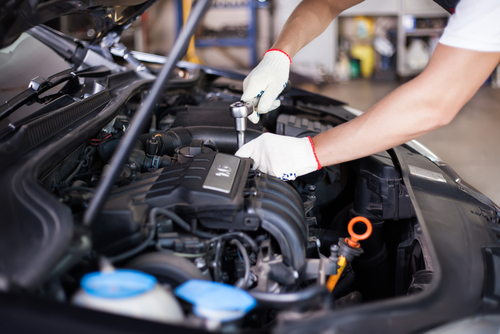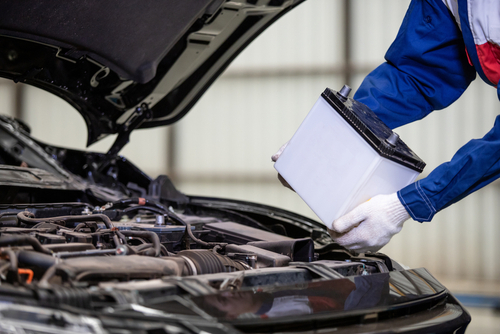
What Parts Are Replaced During A Car Service?
August 23, 2022
Things That Happen If A Car Is Not Serviced Regularly
October 26, 2022How Does A Car Engine Work?

How Does A Car Engine Work? A car engine is a machine designed to convert one form of energy into mechanical work. Heat engines, including car engines, burn fuel to create heat, which is then used to do work. Car engines are typically internal combustion engines, which means they burn the fuel inside the engine itself.
How does a Car Engine work?

The basics of a car engine are quite simple. The engine burns fuel (either gasoline or diesel), and the expanding gases push pistons up and down. These piston movements turn a crankshaft, which is connected to the wheels of the car via the transmission.
The combustion process begins when you turn the key and ignite the spark plugs. This ignites the fuel-air mixture inside the cylinders and causes the pistons to start moving up and down. The expanding gases push the pistons, which in turn rotate the crankshaft. The crankshaft is connected to the transmission, which then sends power to the wheels.
The car engine is a very efficient machine, but it does have some limitations. For one, it can only run on liquid fuels. Additionally, car engines produce a lot of pollution and noise.
What are the Different Types of Car Engines?

There are two main types of car engines:
Gasoline
This is the most common type of car engine. Gasoline engines typically have 4, 6, or 8 cylinders.
Diesel
Diesel engines are less common than gasoline engines, but they are becoming more popular. Diesel engines typically have 4 or 6 cylinders.
The benefits of a car engine include:

There are several benefits of car engines, the following are some of the main benefits:
They are very efficient
When compared to other engines, car engines are very efficient. They convert a high percentage of the fuel’s energy into mechanical work.
They are relatively inexpensive
Car engines are less expensive than other types of engines, such as jet engines.
They produce little pollution and noise
Car engines produce less pollution and noise than other types of engines. Additionally, they can be fitted with catalytic converters to further reduce pollution.
They are easy to maintain
Car engines are relatively easy to maintain. They do not require frequent maintenance, and when they do require maintenance, it is typically not very expensive.
They are relatively small and light
Car engines are typically small and light when compared to other types of engines. This makes them well-suited for use in cars.
The drawbacks of a car engine include:

There are several drawbacks of car engines, the following are some of the main drawbacks:
Car engines produce pollution
As mentioned above, car engines produce a lot of pollution. The combustion process produces air pollutants, such as carbon dioxide and nitrogen oxide. These pollutants can contribute to climate change and respiratory problems.
Car engines are noisy
Another downside of car engines is that they are quite noisy. The ignition, combustion, and exhaust processes all produce noise. This can be a problem for people who live near busy roads.
Car engines require frequent maintenance
While car engines do not require frequent maintenance, they do require more maintenance than other types of engines. For example, gasoline engines need to have their spark plugs replaced every few years.
Car engines are not very efficient
While car engines are relatively efficient when compared to other types of engines, they are not as efficient as some newer technologies. For example, electric cars are more efficient than car engines.
Car engines can only run on liquid fuels
Car engines can only run on liquid fuels, such as gasoline and diesel. This limits the types of fuel that can be used in car engines. Additionally, it makes it difficult to find alternative fuels for car engines.
Those are some of the main benefits and drawbacks of car engines. As you can see, there are both pros and cons to using a car engine. Ultimately, the decision of whether or not to use a car engine depends on your specific needs and preferences.
What are the factors to consider when buying a car engine?

There are several factors to consider when buying a car engine. The following are some of the main factors:
Size
One of the most important factors to consider when buying a car engine is size. You need to make sure that the engine is the right size for your vehicle. If the engine is too small, it will not be powerful enough. If the engine is too large, it will be difficult to install and may damage your vehicle.
Type
Another factor to consider when buying a car engine is type. There are two main types of car engines: gasoline and diesel.
Fuel economy
Another factor to consider when buying a car engine is fuel economy. You want to make sure that the engine is fuel efficient so that you can save money on gas.
Emissions
You also want to make sure that the engine produces low emissions. This is important for both environmental and health reasons.
Maintenance
If you are planning to keep your car for a long time, you will want to consider the maintenance requirements of the engine. You want to make sure that the engine is easy to maintain so that you don’t have to spend a lot of money on car repairs.
Price
Of course, you also want to consider the price when buying a car engine. You want to make sure that you get the best value for your money.
Those are some of the main factors to consider when buying a car engine. If you keep these factors in mind, you should be able to find the perfect engine for your needs.
How Does A Car Engine Work? – Conclusion

Car engines have both benefits and drawbacks. The decision of whether or not to use a car engine depends on your specific needs and preferences. When buying a car engine, you should consider factors such as size, type, fuel economy, emissions, maintenance, and price. If you keep these factors in mind, you should be able to find the perfect engine for your needs.



